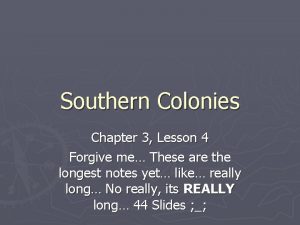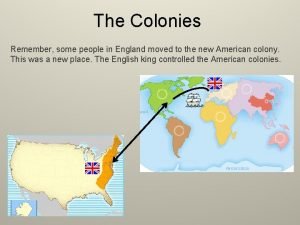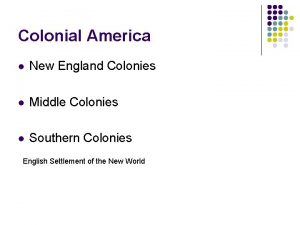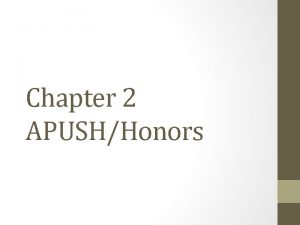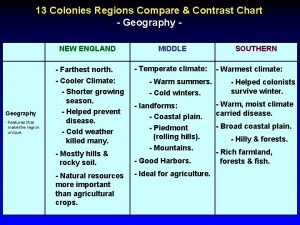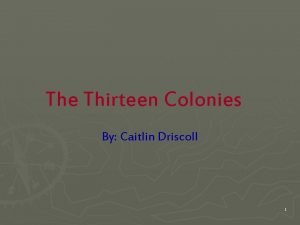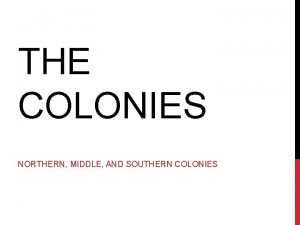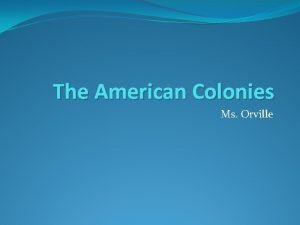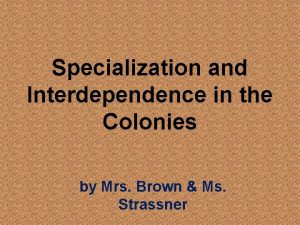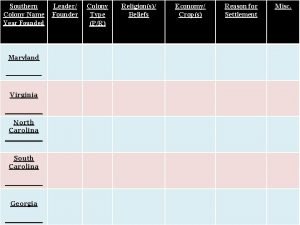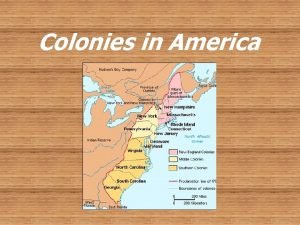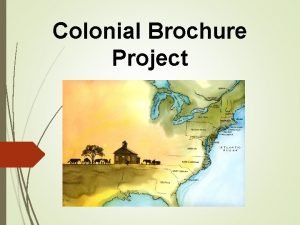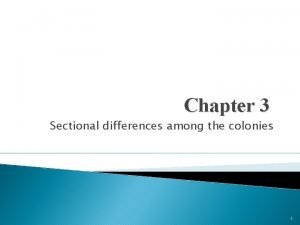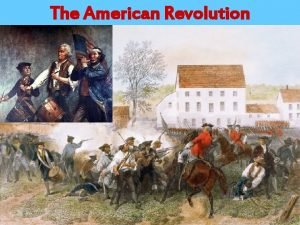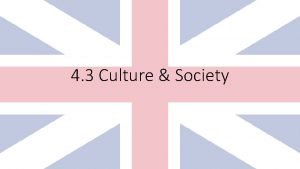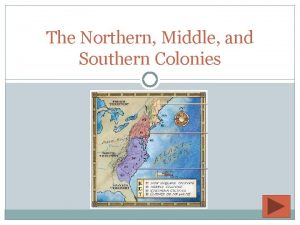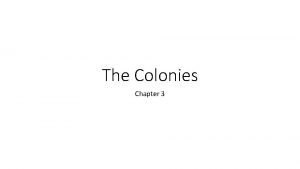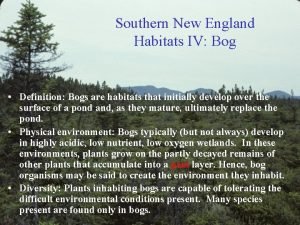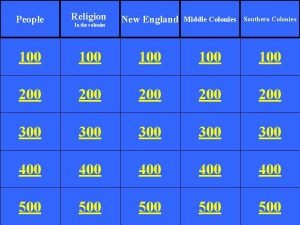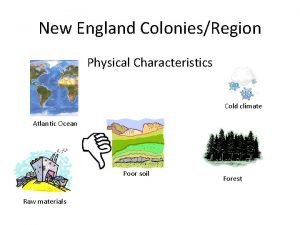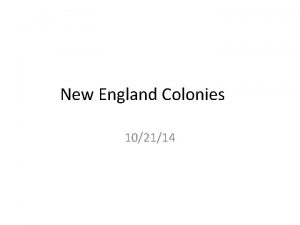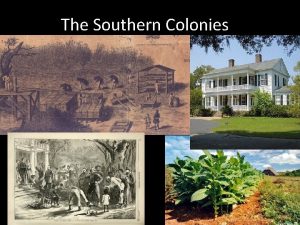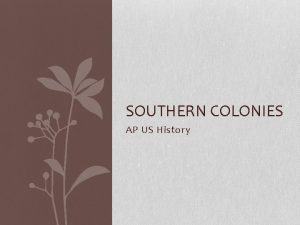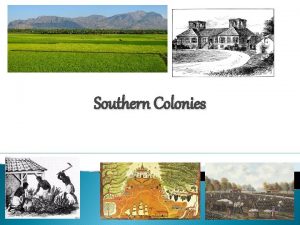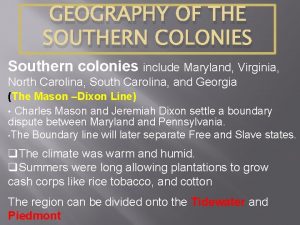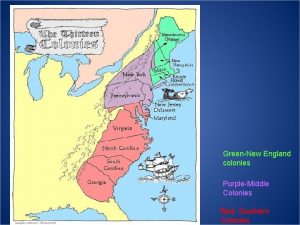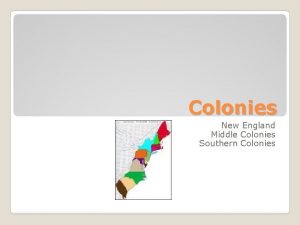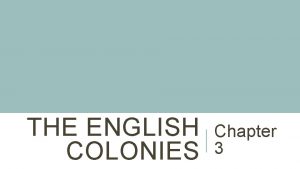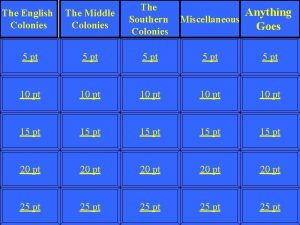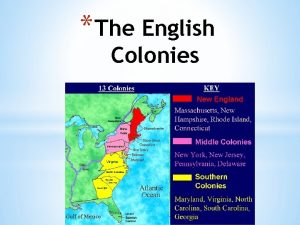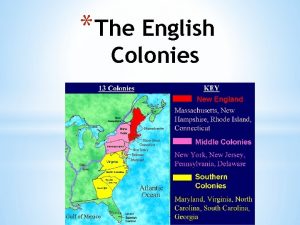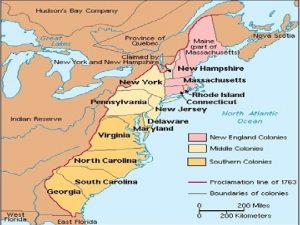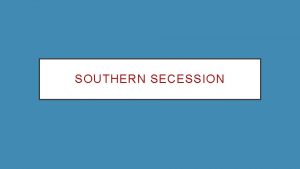The English Colonies Chapter 3 The Southern Colonies























- Slides: 23

The English Colonies Chapter 3

The Southern Colonies - Maryland Virginia North Carolina South Carolina Georgia

The Southern Colonies Settlement of Jamestown, Virginia - Jamestown was founded on May 14, 1607 by 105 colonists sent by the London Company - It was the first permanent English settlement in North America. - Because these settlers were adventurers and not farmers, twothirds of them died by winter.


Daily Life in Virginia - The demand for workers was soon greater than the supply of people willing to work as indentured servants. - This factor led many colonists to begin to use slave labor.

Maryland - Toleration Act of 1649 – made it a crime to restrict religious rights of Christians. - This was the 1 st law supporting religious tolerance passed in the English Colonies. Economies of Southern Colonies - Southern economies depended on agriculture. - The south’s warm climate and long growing season helped tobacco, rice, and indigo become important cash crops. - However, these cash crops needed an enormous amount of labor = SLAVES.

Slave Codes - Slave Codes were laws to control slaves. - Example: laws from the slave codes included slaves not being able to hold meetings or own weapons. *Why would slave owners need slave codes? *

The New England Colonies - Massachusetts New Hampshire Connecticut Rhode Island

The New England Colonies Pilgrims and Puritans - A protestant group called the Puritans wanted to purify, or reform, the Anglican Church. - The Pilgrims were one of the Separatists group that left England in the early 1600’s to escape persecution. They moved to the Netherlands in 1608. - The Pilgrims were immigrants, immigrants people who have left their country of birth to live in another country. - The Pilgrims sailed to the Americas on a ship called the Mayflower.

New England Economy • New England’s economy was largely dependent on the ocean. Fishing (especially codfish) was most important to the New England economy. • Whaling, trapping, shipbuilding, and logging were important also. • New England shippers grew wealthy buying slaves from West Africa in return for rum, and selling the slaves to the West Indies in return for molasses (triangular trade)

The Mayflower Compact - The Pilgrims wanted their own laws and rules to govern the colony. - The male passengers signed the Mayflower Compact, Compact a legal contract in which they agreed to have fair laws to protect the general good. - This represents the first attempt at selfgovernment in the colonies.


Pilgrim’s and Native American’s Celebrated the harvest which became known as the first Thanksgiving

The Middle Colonies - New Jersey Pennsylvania New York Delaware

Middle Colonies - The Middle Colonies economy combined characteristics of New England Southern Colonies. - Indentured servants filled most of the skilled labor jobs in the middle colonies. - However, some slaves were skilled laborers in cities as well as on farms and on board ships.


The Triangular Trade - A system in which goods and slaves were traded among the Americans, Britain, and Africa.

The Great Awakening and the Enlightenment - In the late 1730’s ministers began having revivals, emotional gatherings where people came together to hear sermons. - The Great Awakening was a religious movement that swept through the colonies in 1730 s and 1740 s. - The movement that spread the idea that reason and logic could improve a society was called the Enlightenment. - These movements led to ideas of political equality among many colonists.


The French and Indian War - A dispute occurred because both France and Britain claimed the Ohio River Valley. - When war broke out, it was the French and Indians versus the British. - The Indians and Spanish were allies of the French. - The war began in 1754. - Most of the fighting was in Canada - George Washington lead troops to the Ohio River Valley for Virginia.


The Treaty of Paris (1763) - In 1763, The Treaty of Paris officially ended the war. - The terms of the treaty gave Britain all of Canada, French lands east of the Mississippi River (except the City of N. O. ), and Florida. - This treaty changed the balance of power in North America. - Soon British settlers began moving west to settle new lands.

 Chapter 3 lesson 4 the southern colonies
Chapter 3 lesson 4 the southern colonies Name the southern colonies
Name the southern colonies Religion southern colonies
Religion southern colonies Northern middle and southern colonies venn diagram
Northern middle and southern colonies venn diagram Characteristics of the southern colonies
Characteristics of the southern colonies Comparison chart of colonial regions
Comparison chart of colonial regions Southern colonies
Southern colonies Economy of southern colonies
Economy of southern colonies What are the names of the southern colonies
What are the names of the southern colonies Southern colonies
Southern colonies Southern colonies specialization
Southern colonies specialization Southern colonies founder
Southern colonies founder New england confederation
New england confederation 13 colonies brochure
13 colonies brochure Economy of southern colonies
Economy of southern colonies What country
What country Southern colonies entertainment
Southern colonies entertainment Southern colonies society/culture
Southern colonies society/culture Northern middle southern colonies
Northern middle southern colonies Southern colonies
Southern colonies Southern colonies definition
Southern colonies definition Southern colonies religion
Southern colonies religion Middle colonies physical characteristics
Middle colonies physical characteristics New england, middle and southern colonies comparison chart
New england, middle and southern colonies comparison chart
